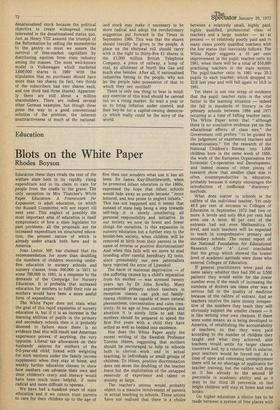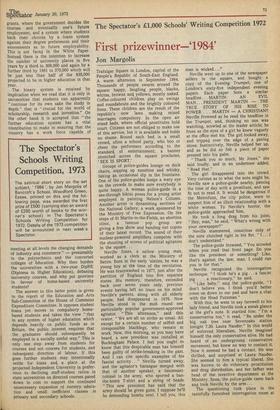Education
Blots on the White Paper
Rhodes Boyson
Education these days rivals the rest of the welfare state both in its rapidly rising expenditure and in its claim to care for people from the cradle to the grave. The only exception in Mrs Thatcher's White Paper, Education: A Framework for Expansion, is adult education, on which the Russell Committee will not report till next year. This neglect of possibly the most important area of education is itself symptomatic of how a state legislates for past problems: all the proposals are for increased expenditure on structured education, the present nature of which is already under attack both here and in America.
Joan Lestor, MP, has claimed that the recommendation for more than doubling the numbers of children receiving underfive education in nursery schools and nursery classes, from 300,000 in 1971 to some 700,000 in 1981, is a response to the demands of the Campaign for Nursery Education. It is probable that increased education for mothers to fulfil their role as mothers would have been a more useful form of expenditure.
The White Paper does not state what the goal of this rapid expansion of nursery education is, but if it is an increase in the learning abilities of pupils in the primary and secondary schools then it is probably doomed to failure since there is no evidence that this will result and American experience proves, if anything, the very opposite. Liberal tax allowances on their husbands' salaries for mothers of the 0-5-year-old child, linked with weighting for such mothers under the family income supplement when they stay at home, and weekly further education classes to show how mothers can advance their own and their children's oracy and literacy would have been much more helpful, if more radical and more difficult to operate.
We have had a hundred years of state education and if we cannot trust parents to care for their children up to the age of five then one wonders what use it has all been. Sir James Kay-Shuttleworth, when he promoted infant education in the 1860s, expressed the hope that infant schools would fade away as people became "more lettered, and less prone to neglect infants." This has not happened and it seems that instead of state help being a step towards self-help it is slowly smothering all personal responsibility and initiative. In our society we now do fewer and fewer things for ourselves. Is this expansion in nursery education but a further step to the broiler-hen society, when children will be removed at birth from their parents in the name of reverse or positive discrimination? And when this fails will we move to stud breeding after careful hereditary IQ tests, since presumably our new paternalists have rejected the error of Lysenko?
The harm of maternal deprivation — of the suffering caused by a child's separation from his mother — was stressed twenty years ago by Dr John Bowlby. Many experienced primary school teachers in reception classes can pick out familyreared children as capable of more natural pleasantness, concentration and calm creativity. In an age of free contraception and abortion it is surely little to ask that mothers should be prepared to spend the first five years with a child they have willed as well as bedded into existence.
Nor does the White Paper apply the recent writing of the Swedish Professor Torsten Hilsen, suggesting that mothers should be encouraged to help in schools both in clerical work and in actual teaching, to individuals or small groups of children. To Hilsen, positive discrimination does not mean the doubling of the teacher force but the exploitation of the untapped reservoir of experience and talent in society at large.
The teacher's unions would probably object to a massive involvement of parents in actual teaching in schools. These unions have not realised that there is a choice between a relatively small, highly paid, highly qualified, professional class of teachers and a large number — as at present — of relatively poorly paid and in many cases poorly qualified teachers with the low status that inevitably follows. The White Paper suggests a 10 per cent improvement in the pupil: teacher ratio by 1981, when there will be a total of 510,000 practising teachers in the state system. The pupil:teacher ratio in 1961 was 25.3 pupils to each teacher, which dropped to 22.6 last year and will fall again to 18.5 in 1981.
Yet there is not one scrap of evidence that the pupil: teacher ratio is the vital factor in the learning situation — indeed the fall in standards of literacy in the primary schools between 1964 and 1971 occurred at a time of falling teacher ratio. The White Paper notes that "although there is no conclusive evidence yet on the educational effects of class size," the Government still prefers "to be guided by the judgement of experienced teachers and educationalists." Yet the research of the National Children's Bureau into 1,000 children born in the same week of 1958, the work of the European Organisation for Economic Co-operation and Development, and indeed dozens of other pieces of research show that smaller class size is often counterproductive in education, probably because it simply encourages the introduction of inefficient ' discovery ' methods.
What does matter in schools is the calibre of the individual teacher. Yet only 40.5 per cent of entrants to Colleges of Education in September 1972 had two or more A levels and only 68.4 per cent had even one A level; 40 per cent of the entrants had not even Mathematics 0 level, and such teachers will be expected to teach in comprehensive primary and secondary schools. The recent report of the National Foundation for Educational Research After 'A' Level concluded that the group which showed the lowest level of academic aptitude were those who entered Colleges of Education.
If general practitioners were paid the same salary whether they had 350 or 3,500 patients they would settle for the lower number even if the result of increasing the numbers of doctors ten times over was a serious fall in the quality of medicine because of the calibre of entrant. And as teachers receive the same money irrespec tive of the numbers they teach they will obviously support the smaller classes — it is like writing your own cheques. If there were some means, as is being developed in America, of establishing the accountability of teachers, so that they were paid according to the number of children they taught and what they achieved, able teachers would settle for larger classes tomorrow and, by a relative fall in salaries, poor teachers would be forced out. At a time of open and concealed unemployment there will be no shortage of applicants for teacher training, but the calibre will drop as it has already to the second 20 percentile in academic ability and as it may to the third 20 percentile so that bright children will stay at home and read books.
On higher education a choice has to be made between a system of free places with grants, where the government decides the courses and eventually one's future employment, and a system where students back their choices by a loans system against their degree preferences and their assessments as to future employability. This is not faced in the White Paper. Instead there is the intention to increase the number of university places in five years by a third to 306,000 and again by a further third by 1981 to 370,000 which will be just less than half of the 835,000 projected to be in higher education in that year.
The binary system is retained by implication when we read that it is only in universities that students can apparently "continue for its own sake the study in depth " that is " crucial for the world of scholarship, research and invention." On the other hand it is accepted that "the further education system has a vital contribution to make in ensuring that the country has a work force capable of
meeting at all levels the changing demands of industry and commerce" — presumably in the polytechnics and the converted colleges of 'e du cation. Why then burden the universities with a two-year DipHE (Diploma in Higher Education), debasing university courses, and why put provisos in favour of home-based university students?
The answer to this latter point is given in the report of the Education and Arts Sub-Committee of the House of Commons Expenditure Committee. It opposes student loans yet moves to compulsory homebased students and takes the view "that in any system of higher education which depends heavily on public funds as in Britain, the public interest requires that the graduates should subsequently be employed in a socially useful way." This is only one step away from students for courses and not courses for students, and subsequent direction of labour. If this goes further students may intentionally settle for loans and, a place at the projected Independent University in preference to declining staff-student ratios in state universities on directed courses pared down in cost to support the continued unnecessary expansion of nursery education and small inefficient classes in primary and secondary schools.



































 Previous page
Previous page